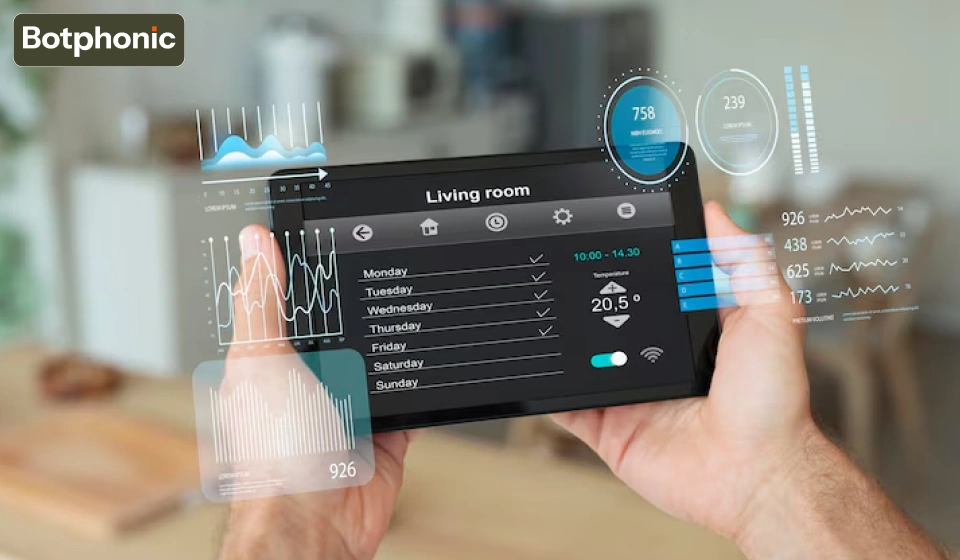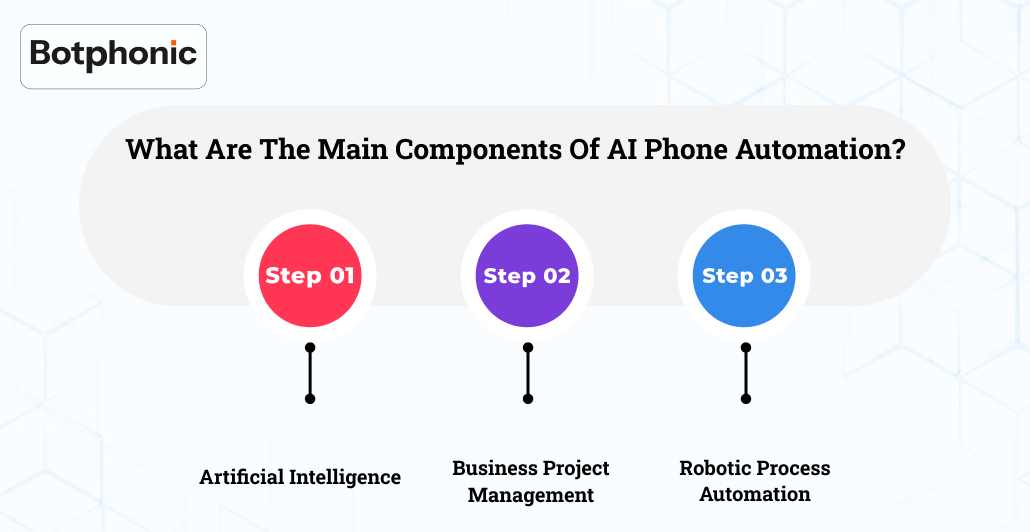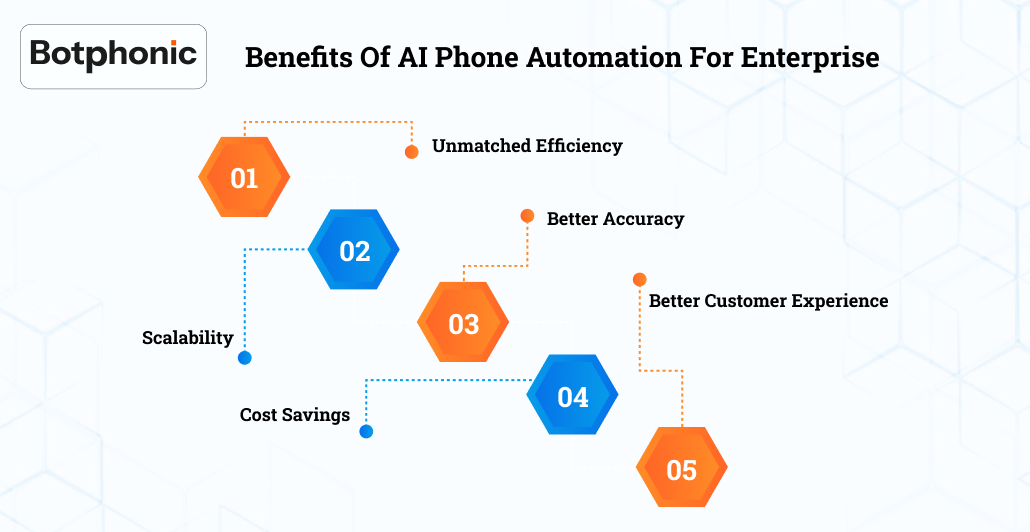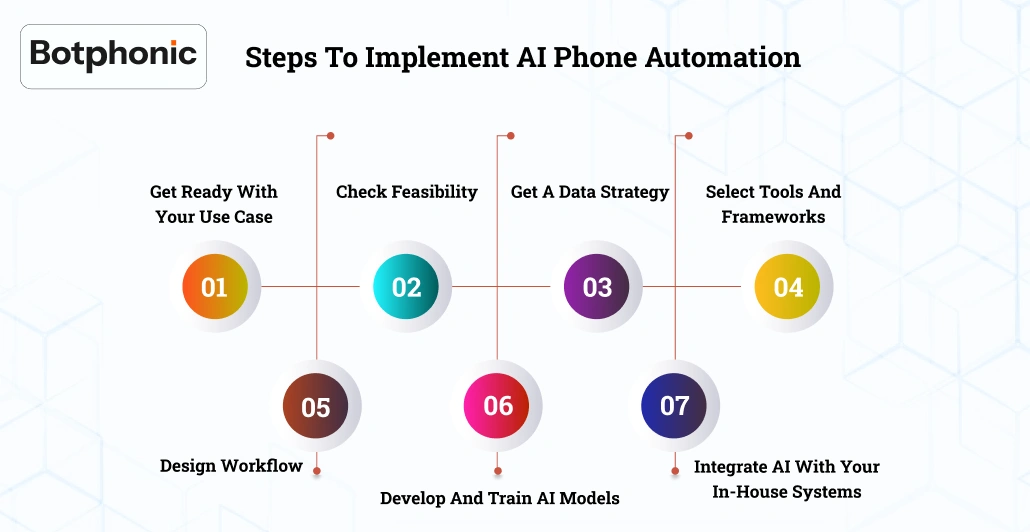
Summarize Content With:
Summary
Why depend on slower and manual processes when AI can do it quickly and efficiently? AI phone automation comparison enterprise can help companies in optimizing their workflow and derive measurable results. This blog will help you understand how AI phone automation drives excellent results for an enterprise.
Introduction
We all are aware of the fact that businesses face plenty of challenges in this competitive landscape. One of the main challenges is to make operations optimum and yet productive all of this while handling complex tasks. Completing these tasks manually can lead to mistakes and even restrict your growth. Why not make use of AI phone automation instead?
AI can be beneficial in streamlining operations, enhancing efficiency and catalyse your growth. By performing all repetitive tasks, AI allows employees to concentrate on more crucial tasks. Hence AI is not a luxury anymore it is a necessity for each enterprise.
The AI process automation global market has crossed $13.6 billion in 2022 and might reach $25.9 by the end of 2027. In this we will have a look at how this AI automation is helpful and carry out an AI phone automation comparison enterprise must know about.
What are the main components of AI phone automation?

AI powered automation is tremendously growing so let’s explore its key components:
1. Artificial intelligence
AI functions as the brain of automation that helps systems conduct tasks smoothly like humans. Its core functions are:
- Understanding language: AI now has an ability to understand and respond to humans and make these interactions more intuitive. All thanks to Natural Language Processing.
- Pattern recognition: AI can go through a huge amount of data to detect the trend and anomalies. It further helps in making informed decisions.
- Problem solving: Machine learning makes AI capable of learning from past mistakes and improving them.
2. Business project management
BPM is primarily responsible for automating workflow. When you combine it with AI it can result into:
- Increased agility: Businesses can change quickly with the market and operational demands.
- Error reduction: When you automate business processes it leads to lesser mistakes and better consistency.
- Enhanced productivity: Streamlining workflows help you save money and enhance the experience of employees.
3. Robotic process automation
RPA helps in automating repetitive tasks such as customer support and routine inquiries. Its key aspects are:
- Task automation: AI bots can easily perform tasks such as data entry, processing invoice, and completing forms. All of this is done accurately.
- Integrating AI: When you combine robotic process automation with AI it can even handle more complex tasks necessary for making decisions.
In case you are thinking of AI phone automation for your business feel free to check our solutions page!
Smarter automation starts here. Launch your Botphonic AI trial now!
Get startedBenefits of AI phone automation for enterprise

Thinking about what benefits can your enterprise enjoy after AI phone automation. Let’s have a look:
1. Unmatched efficiency
AI systems are developed capable enough to complete tasks faster than humans. Hence they provide better productivity and improvement irrespective of sectors. For example, AI driven robots are never tired. They keep on operating without fatigue and complete tasks in a noticeably lesser time.
2. Scalability
The most crucial reason to use AI phone Automation is its scalability. These tools can scale operations and grow with your business. For example during peak hours AI becomes capable of handling any number of calls and reverting to them with the same consistency. It is seen that businesses that leverage AI can scale their business without increasing operational costs.
3. Better accuracy
AI phone automation is the best choice when it comes to precision and accuracy. Hence it is necessary for data intensive tasks. AI can process a vast amount of data without commuting error. It can enhance the quality of output in areas such as finance and quality control.
4. Cost savings
When you automate your repetitive tasks it can lessen costs in both labor and operations. Businesses can also possibly reduce the labor costs by 30% as per experts through usage of AI. You will not have to hire an extra staff just repeating the same line in customer service as AI can do it for you.
5. Better customer experience
AI systems are now equipped with sentiment analysis and can understand customer behaviour easily. Hence they can provide them with personalized recommendations. For example they can access your CRM and stored data to suggest the exact service your consumer is searching for.
Steps to implement AI phone automation

Convinced to use AI phone automation for your enterprise? Then here are steps to do it:
1. Get ready with your use case
To make AI useful in your enterprise you will have to initially start by defining your use case. Research where AI phone automation can add value. You can try automating customer service, data process, predictive maintenance and more. Having a clear idea of use can make better application of resources and efforts.
2. Check feasibility
If you have chosen your use case, check for the feasibility as the second step. Factors like availability of data, complexity and ROI are also necessary. Hence it can help you check if it’s worth investing or not.
3. Get a data strategy
Data is the core of AI phone automation. Hence having a strategy for collection, storage and management of data is a must. Make sure your CRM has high quality and relevant data. It is because AI relies heavily on data training. Also comply with necessary rules and regulations to govern security and integrity of data.
4. Select tools and frameworks
After identifying use cases you will have to finalize upon the framework and the tools to be used. You have to choose tools that you want to employ which includes machine learning, natural language processing and RPA tools. It means choosing a provider like Botphonic AI that helps you develop your AI model without getting into more technicalities. Conduct an AI phone automation comparison enterprise research before making final choice.
5. Design workflow
Now you have to design a workflow which will define the capabilities of your AI into the present process. It will include everything from how AI will interact with systems, make decisions and outline roles of human operators and automated systems.
6. Develop and train AI models
Now once you have made primary decisions it’s time to build and train your AI phone automation tool. It includes selecting the right algorithms, engineering details, and using the data to train your model. Once it’s ready you have to test models to ensure that it meets your standards.
7. Integrate AI with your in-house systems
After your AI model is ready you have to integrate it with your existing systems. AI assistants developed by Botphonic are capable of seamlessly integrating with existing systems. It can include API development, or direct integration. It ensures that data flows smoothly between systems for an effective AI output.
AI phone automation comparison for enterprise
| Feature/Criteria | Botphonic | Retell AI | Bland AI | Synthflow AI |
| Ease of Setup | No-code platform with quick onboarding | Middleware approach; needs external LLM and phone provider | Simple setup, but limited enterprise features | No-code, but setup may require more technical input |
| Scalability | Built for enterprise-grade scalability | Better suited for smaller, early-stage use cases | Works well for smaller teams, less enterprise focus | Can scale, but best for mid-sized teams |
| Customization | Flexible workflow design and integrations | Customizable if you bring your own stack | Limited customization | Offers customization with in-house models |
| Integration | Supports major CRM and API integrations | API-first approach, but relies on external systems | Limited integrations | Offers integrations but fewer enterprise connectors |
| AI Models | Optimized for enterprise voice automation | BYO-LLM; depends on what you connect | Uses general-purpose AI models | Proprietary models tailored to use cases |
| Voice Quality | Natural, enterprise-ready voice output | Depends on the chosen phone provider | Average, less natural | Good quality but varies by model |
| Security & Compliance | Enterprise-level compliance & security standards | Basic compliance (depends on external providers) | Not specifically enterprise-focused | Offers compliance, but not as robust as Botphonic |
| Support | Dedicated enterprise support | Community-driven, limited enterprise support | Limited support | Standard support, not enterprise priority |
| Best Fit | Large enterprises seeking reliability, integrations, and scale | Startups running pilot projects | Small teams experimenting | Mid-sized companies testing AI voice |
Conclusion
In a landscape where efficiency and accuracy are an unavoidable measure of success, AI phone automation has grown to be a necessary tool. From streamlining complex processes to making scalability easier, the right AI call assistant will transform how your enterprise operates routinely.
By comparing between platforms and understanding their features, enterprises are capable of selecting solutions that fit their needs. Platforms such as Botphonic AI provide flexibility, ease of integration and reliability.
Investing in AI phone automation today is above adopting a technology, it’s all about making your enterprise ready for a future that drives smarter results.

